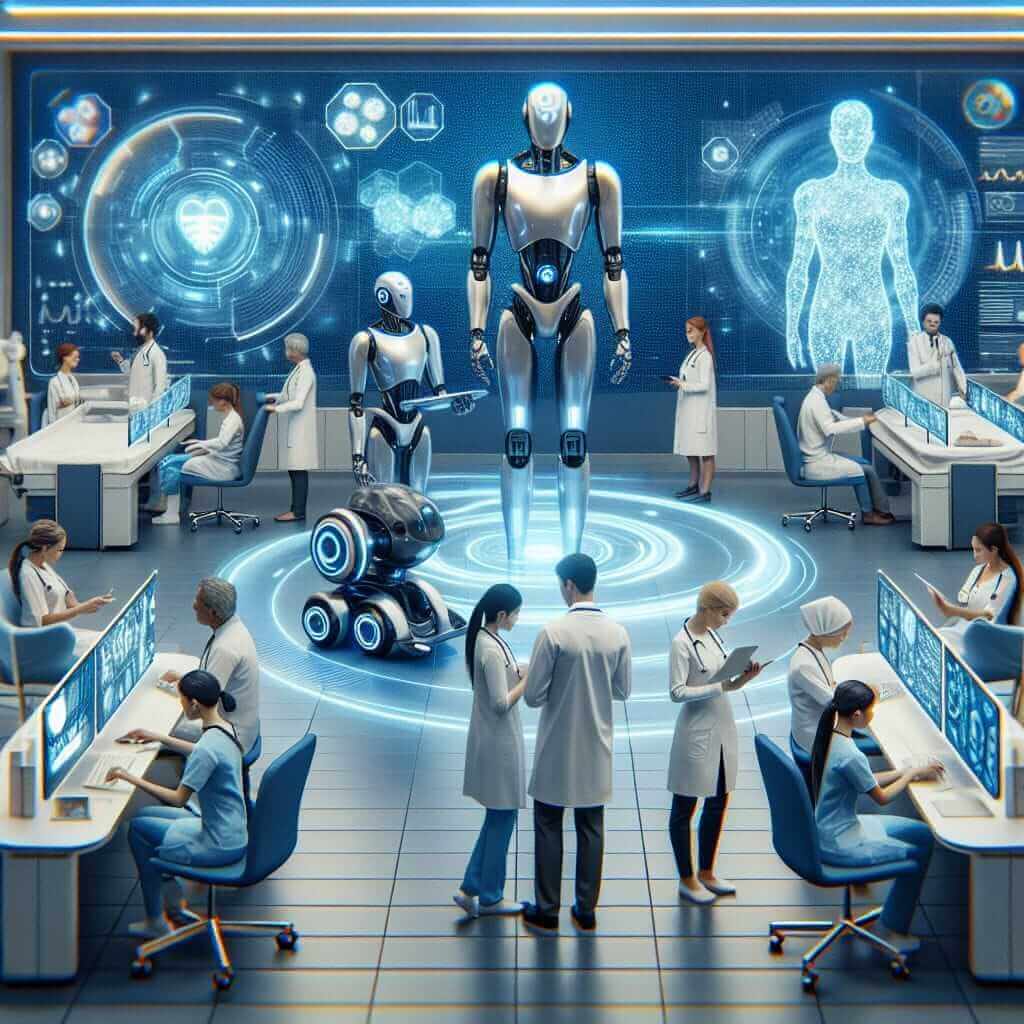The IELTS Reading section is designed to test a variety of reading skills, including reading for gist, reading for main ideas, reading for detail, skimming, understanding logical argument, and recognizing writers’ opinions, attitudes, and purpose. Subjects related to advancements in technology and their impact on different sectors, particularly healthcare, have become increasingly prevalent. Recently, the role of Artificial Intelligence (AI) in healthcare is a hot topic due to its potential to revolutionize the medical field.
This article presents a detailed IELTS Reading practice exercise focused on the topic “How does AI influence the future of healthcare?” based on past exam formats and trends.
Comprehensive Reading Passage
Passage: The Impact of AI on the Future of Healthcare
Artificial Intelligence (AI) is rapidly transforming the landscape of healthcare. It offers the potential to improve diagnostics, treatment plans, patient monitoring, and even operational efficiencies within healthcare institutions. The integration of AI in healthcare brings about both opportunities and challenges that will shape the future of medical care.
AI’s ability to analyze vast amounts of data quickly and accurately has made it invaluable in the field of diagnostics. Machine learning algorithms can identify patterns that may not be evident to human practitioners, thus enabling earlier and more precise diagnoses. For instance, AI applications in radiology can highlight anomalies in medical images that may indicate conditions such as cancer at a stage when intervention is most effective.
< AI in Healthcare>
AI in Healthcare>
Treatment plans also benefit from AI as machine learning models can provide personalized treatment recommendations based on a patient’s genetic makeup and medical history. This approach, known as precision medicine, increases the likelihood of successful outcomes and reduces the instances of adverse reactions.
Moreover, AI-powered devices and applications are revolutionizing patient monitoring. Wearable devices that track vital signs in real-time can alert healthcare providers to potential issues before they become critical. This proactive approach to patient care can significantly enhance patient outcomes and reduce hospital readmissions.
Operational efficiencies in healthcare settings are another area where AI is making a significant impact. Predictive analytics can forecast patient admissions, allowing for better resource allocation and staff scheduling. Additionally, AI can optimize supply chain management, ensuring that medical supplies are available when needed, thus preventing operational downtimes.
However, the adoption of AI in healthcare is not without its challenges. Data privacy and security are paramount concerns, given the sensitive nature of medical information. Ensuring that AI systems are transparent and free from biases is also critical to gain the trust of both healthcare providers and patients.
In conclusion, while AI offers unprecedented opportunities to enhance healthcare delivery, it also poses significant challenges that must be addressed. The future of healthcare will likely see a seamless integration of AI, leading to improved patient outcomes, more efficient healthcare operations, and ultimately, a transformation in how care is delivered.
Questions
Reading Comprehension Questions
Multiple Choice
- What is one of the main advantages of AI in diagnostics?
- A. It reduces the cost of healthcare.
- B. It can analyze large amounts of data quickly.
- C. It replaces human practitioners.
- D. It increases the number of staff required.
True/False/Not Given
- AI applications in radiology can detect cancer at a stage when intervention is most effective.
- True
- False
- Not Given
Matching Information
- Match the following benefits of AI with the correct field:
- (i) Early and precise diagnoses
- (ii) Personalized treatment
- (iii) Real-time patient monitoring
- (iv) Operational efficiency
- A. Radiology
- B. Precision medicine
- C. Wearable devices
- D. Predictive analytics
Sentence Completion
- The __ approach to patient care, supported by AI-powered devices, can significantly enhance patient outcomes and reduce hospital readmissions.
Answers and Explanations
- B. It can analyze large amounts of data quickly. (Explanation: This is highlighted in the passage where AI’s ability to quickly and accurately analyze vast amounts of data is mentioned as invaluable in diagnostics.)
- True (Explanation: The passage explicitly states that AI applications in radiology can highlight anomalies in medical images that may indicate cancer at a stage when intervention is most effective.)
-
- (i) Early and precise diagnoses – A. Radiology
- (ii) Personalized treatment – B. Precision medicine
- (iii) Real-time patient monitoring – C. Wearable devices
- (iv) Operational efficiency – D. Predictive analytics
- proactive (Explanation: The passage mentions that a proactive approach to patient care supported by AI-powered devices can significantly enhance patient outcomes and reduce hospital readmissions.)
Common Mistakes
- Misinterpreting the text: Ensure you understand the context in which information is provided to avoid selecting incorrect answers.
- Skimming too quickly: Balance speed with comprehension to ensure you don’t miss crucial details.
- Ignoring question instructions: Pay close attention to question types, as each demands a different approach.
Vocabulary
- Diagnostics (n.) /ˌdaɪəɡˈnɒstɪks/: The process of determining the nature of a disease or condition.
- Precision Medicine (n.) /prɪˈsɪʒən ˈmɛdɪsɪn/: An approach to patient care that allows doctors to select treatments most likely to help patients based on a genetic understanding.
- Wearable devices (n.) /ˈweərəbəl dɪˈvaɪsɪz/: Electronic devices worn on the body that track health metrics like heart rate.
- Predictive analytics (n.) /prɪˈdɪktɪv əˈnælɪtɪks/: Techniques used to make predictions about future events based on historical data.
Grammar Point
Conditional Sentences
-
Type Zero (General Truths):
- Structure: If + Present Simple, Present Simple
- Example: If AI systems are transparent, they gain the trust of both healthcare providers and patients.
-
Type One (Real Situations):
- Structure: If + Present Simple, will + Base Verb
- Example: If AI continues to advance, it will transform healthcare delivery.
Tips for IELTS Reading
- Practice Regularly: Regular reading will improve your speed and comprehension.
- Expand Vocabulary: A broad vocabulary aids in understanding varied texts.
- Answer All Questions: Even if unsure, answer all questions as there is no penalty for guessing.
By practicing with passages on current topics such as “How does AI influence the future of healthcare?”, you can improve your reading skills and prepare effectively for the IELTS exam. Good luck with your studies!


